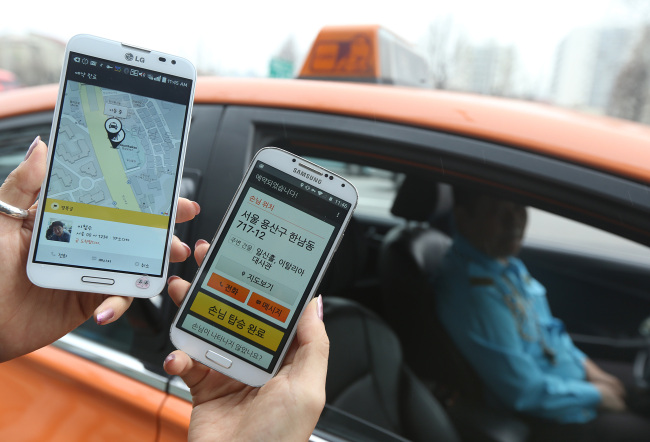Taxi apps poised to challenge Uber in Korea
Tech firms team up with taxi drivers
By Kim Young-wonPublished : April 1, 2015 - 20:03
Taxi and ride-sharing smartphone apps, mainly spearheaded by Uber, have brought seismic changes to not only the information technology industry, but also to the broader transportation sector at home and abroad.
An increasing number of people, especially the younger generation, often use smartphones to hail taxis. This can be as simple as a few taps on their device, instead of standing on the side of road waving their arms around, or sometimes even shouting to catch cabs.
Jumping on this bandwagon, more local mobile services firms are rolling out taxi apps in Korea.
An increasing number of people, especially the younger generation, often use smartphones to hail taxis. This can be as simple as a few taps on their device, instead of standing on the side of road waving their arms around, or sometimes even shouting to catch cabs.
Jumping on this bandwagon, more local mobile services firms are rolling out taxi apps in Korea.

One notable example is KakaoTaxi, which was launched Tuesday by Daum Kakao, Korea’s top Web-portal and mobile messenger operator. Partnering with the four largest unions of Korean taxi operators, including the Korea National Joint Conference of Taxi Association, Daum Kakao aims to take the lead in the taxi service app market.
The mobile messenger operator, which has more than 170 million subscribers worldwide, including 37 million from Korea, has eliminated barriers that could have hampered mobile users from gaining access to the app.
“KakaoTaxi has simplified the subscription process by allowing mobile users to register with their KakaoTalk accounts. It does not have any payment solutions attached to it for the moment, since payment systems often require a long registration process with credit card data,” Rio Kang, a PR staffer from Daum Kakao.
In order to attract more users, the mobile messenger firm will exempt KakaoTaxi users from paying commission fees for the time being. Users can also receive notices for estimated waiting times, the fare amount, and the ability to share trip information with friends via KakaoTalk.
Not to be outdone by Daum Kakao, SK Planet, a mobile messenger operator and a subsidiary of Korea’s top mobile carrier SK Telecom, has thrown its hat in the ring as it gears up to launch T-Map Taxi on April 14. The app for taxi drivers is already up and running.
T-Map Taxi has two distinct competitive edges over rivals; it will be coupled with the company’s T-Map, Korea’s No.1 GPS navigational app, which boasts 18 million subscribers, and it will be distributed to taxi drivers of the company’s existing taxi booking service, Navicall, which has been on the market since 2007.
SK Planet will first work with 14,000 taxi drivers from 200 taxi companies nationwide that are in partnership with the SK Group affiliate. It plans to collaborate with more taxi firms in the future.
Industry officials and market watchers expect that the growing taxi-hailing business will bring positive changes to the industry as overall service standards are likely to improve.
Some start-ups are also coming up with apps, targeting fractions of the smartphone-based cab-booking market, such as Limo Royal, a premium limousine chauffer service, which has been developed by LimoTaxi Korea.
Taxi drivers and companies in Korea have long been criticized for a lack of effort in enhancing taxi services and ill-mannered practices, such as refusing to pick up passengers who require long trips.
“It is actually encouraging to see more companies jump onto the taxi app market and increase the overall market size,” said an official from the PR agency for Uber Korea, adding that Uber was also making efforts to beef up its business in Korea.
Uber’s car sharing service Uber X has been banned since last year by the Seoul Metropolitan Government, which has argued that the service breaches Korea’s transportation laws that prevent individuals from using their private vehicles or rental cars for commercial transportation.
Other Uber services, including Uber Taxi and Uber Black, are still operating in the city.
Some market watchers suspect the city government’s negative views on the foreign firm, which is backed by Internet giant Google, have helped local taxi app developers gain a footing in the market.
“People need to be aware that the taxi app services which are now emerging have long been planned by mobile services firms. The increase of these apps has nothing to do with the city’s efforts to ban illegal Uber services,” an official from the city government’s urban transportation department said.
By Kim Young-won (wone0102@heraldcorp.com)




![[Herald Interview] 'Amid aging population, Korea to invite more young professionals from overseas'](http://res.heraldm.com/phpwas/restmb_idxmake.php?idx=644&simg=/content/image/2024/04/24/20240424050844_0.jpg&u=20240424200058)











![[KH Explains] Korean shipbuilding stocks rally: Real growth or bubble?](http://res.heraldm.com/phpwas/restmb_idxmake.php?idx=652&simg=/content/image/2024/04/25/20240425050656_0.jpg&u=)

